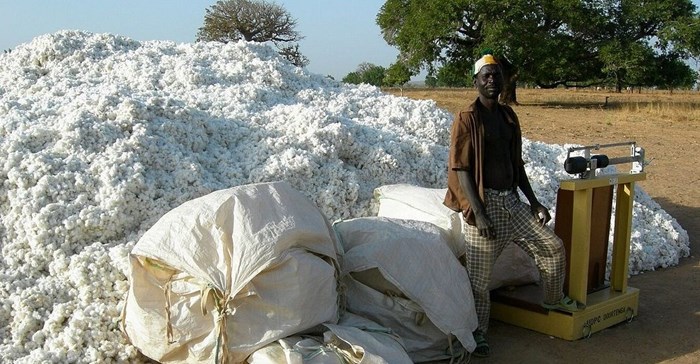Ouagadougou: Burkina Faso, Africa's top cotton producer and the sole West African nation to venture into biotech farming, is dropping genetically modified (GM) cotton on quality grounds.
The world's 10th largest cotton producer, with four of its 19 million people dependent on the "white gold", Burkina Faso earlier this month said it was giving up Monsanto's GM Bt cotton because it had proved uneconomical.
Drop in quality
Burkina took up GM cotton in the 2000s in the hopes of bumping up returns on what was then its top export product, surpassed in 2009 by gold. But the country's association of cotton producers now say GM cotton, though producing higher yields, has caused a drop in crop quality.
"The cotton fibre we are producing today is short," Burkina Faso's new president Roch Marc Christian Kabore told AFP this month. Fibre length is key in textiles with longer ones tending to produce stronger yarns because they allow fibres to twist around each other more times, also enabling higher spinning speeds. But the shorter fibres now being produced from Burkina's GM cotton "means that in market terms it's an activity which is no longer very attractive for us," the president said.
The government, he added, has taken steps "to underpin the sector... and help producers." Those measures include tens of thousands of dollars worth of seed and fertiliser subsidies as well as price controls for producers to offset market falls.
Back to conventional production
Burkina's Inter-professional Cotton Association (AICB), grouping the country's main producers and the national cotton farmers' union, is now targeting "100 percent conventional" production, Wilfried Yameogo, director of Sofitex, Burkina Faso's main cotton company, said earlier this month.
"It's a battle won," added Christian Legay of the national council of organic food processors, an umbrella organisation of consumer groups and farm workers which want a five-to-10 year moratorium on transgenic cotton in Burkina Faso.
But qualms over GM products and "frankenfoods" played no role in the about-face. With Burkinabe cotton once prized for its purity and length of fibre, it was the fall in quality that weighed in favour of a return to conventional cotton.
Producers say this resulted in the sector incurring losses between 2011 and 2016 of some 48.3 billion CFA francs ($82.4 million). They insist these must come back to them in the form of compensation.
GM gave hope for greater production
In the 2000s, the emergence of GM had fuelled hopes of greater production and also reduced the need for fertiliser. This was a key issue in a region prone to drought and where cotton pests had grown resistant to eradication by pesticides. Insecticide-resistant caterpillars - the 'Helicoverpa armigera known as the cotton bollworm or Old World (African) bollworm - wreaked havoc on crops and producers' livelihoods in 1991, 1996 and 2000.
GM crops were supposed to be a win-win solution - reducing the number of pesticide treatments as well as boosting yields by as much as 90 percent, boosting per hectare profits. Celestin Dala, a producer in Nayala in the west of the country, said that "with GM cotton two treatments are required - six with conventional."
In 2003, Burkina authorised experimental planting by US seed giant Monsanto and Swiss multinational Syngenta. Then in 2007, Burkina launched large-scale production of transgenic cotton. Two years later, the authorities ordered farmers to seed up to 80 percent of their crop with the GM variant, leading to a reduction in labour time and facilitating the backbreaking work involved.
Tactical withdrawal or timely warning
Researchers, political and community leaders were critical of the move to launch GM crops from the outset. "The principle of precaution was not respected," says Jean-Didier Zongo, a geneticist from the University of Ouagadougou, who accuses Monsanto of "criminal" acts. He alleges the firm provided insufficiently tested seed varieties.
"These allegations are false," fired back Monsanto spokesman Billy Brennan. He said Monsanto seeds have brought about "better yields, lower pesticide dosage and greater export volumes" to produce a "positive impact on 350,000 producer farms." President Kabore told AFP that Burkina Faso's authorities are "pursuing talks with Monsanto".
Though the country's producers are demanding redress for the loss of income they say they can think again in the future. "If in three, four or five years they (Monsanto) find a solution, there is no reason why we would not go back to towards GM", said Yameogo of Sofitex. "What we have here is a tactical withdrawal - not a total rejection of GM."
But organic activist Legay says Burkina Faso's decision to step back from transgenic cotton is "a timely warning for other African countries".
Source: AFP















